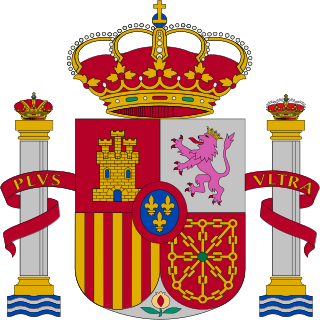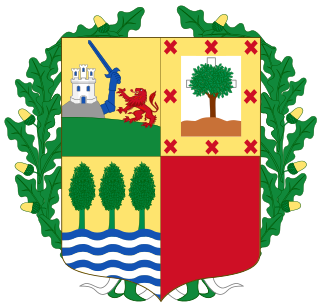
The politics of Spain takes place under the framework established by the Constitution of 1978. Spain is established as a social and democratic sovereign country wherein the national sovereignty is vested in the people, from which the powers of the state emanate.

The autonomous communities are the first-level administrative divisions of Spain, created in accordance with the Spanish Constitution of 1978, with the aim of guaranteeing limited autonomy to the nationalities and regions that make up Spain.

The Spanish Constitution is the supreme law of the Kingdom of Spain. It was enacted after its approval in a constitutional referendum; it represents the culmination of the Spanish transition to democracy.

The Statute of Autonomy of the Basque Country of 1979, widely known as the Statute of Gernika, is the legal document organizing the political system of the Autonomous Community of the Basque Country' which includes the historical territories of Alava, Biscay and Gipuzkoa. It forms the region into one of the autonomous communities envisioned in the Spanish Constitution of 1978. The Statute was named "Statute of Gernika" after the city of Gernika, where its final form was approved on 29 December 1978. It was ratified by referendum on 25 October 1979, despite the abstention of more than 40% of the electorate. The statute was accepted by the lower house of the Spanish Parliament on November 29 and the Spanish Senate on December 12.

Spain is a diverse country integrated by contrasting entities with varying economic and social structures, languages, and historical, political and cultural traditions. The Spanish constitution responds ambiguously to the claims of historic nationalities while proclaiming a common and indivisible homeland of all Spaniards.

Andalusian nationalism is the nationalism that asserts that Andalusians are a nation and promotes the cultural unity of Andalusians. In the past it was considered to be represented primarily by the Andalusian Party, but the party disbanded in 2015. In 2021, the left-wing Andalusian nationalist party Adelante Andalucía was formed, obtaining representation in the 2022 regional election.

The Basque Autonomous Community [ A.C.], also officially called Euskadi [], is an autonomous community in northern Spain. It includes the Basque provinces of Araba, Bizkaia, and Gipuzkoa. It also surrounds an enclave called Treviño.
The 2009–2011 Catalan independence referendums, a series of non-binding and unofficial referendums, "popular votes", took place in municipalities around Catalonia. In them voters indicated whether they supported Catalan independence from Spain. The first such referendum took place in Arenys de Munt on 13 September 2009: there followed votes in Sant Jaume de Frontanyà on 12 December and in 166 other municipalities on 13 December. Another vote ensued in April 2011 in Barcelona.
The Statute of Autonomy of Catalonia of 2006 provides Catalonia's basic institutional regulations under the Spanish Constitution of 1978. It defines the rights and obligations of the citizens of Catalonia, the political institutions of the Catalan community, their competences and relations with the rest of Spain, and the financing of the Government of Catalonia.

A referendum on the approval of the Basque Statute of Autonomy was held in the Basque Country on Thursday, 25 October 1979. Voters were asked whether they ratified a proposed Statute of Autonomy of the Basque Country bill organizing the historical territories of Álava, Biscay and Gipuzkoa into an autonomous community of Spain. The final draft of the bill had been approved by the Basque parliamentary assembly on 29 December 1978, but it required ratification through a binding referendum and its subsequent approval by the Spanish Cortes Generales, as established by Article 151 of the Spanish Constitution of 1978.
The constitution of Spain of 1978 allowed for the nationalities and regions that make up the Spanish nation to accede to self-government and be constituted as autonomous communities, which became the first-order political and territorial division of the Spanish territory. Both the process whereby the nationalities and regions were to accede to self-government and the scope of competences that were to be devolved or transferred from the central government, were intended to be asymmetrical in nature.

The conflict over the Treviño enclave is a territorial dispute in northern Spain between the administration of the Province of Burgos and Castile and León on the one side, and those of Álava and the Basque Country on the other, over the administration of the territory. The conflict does not only involve territorial questions, but also extends to political and language issues, as well as questions about provision of services and transport connections.
A referendum on the approval of the Catalan Statute of Autonomy was held in Catalonia on Sunday, 2 August 1931. Voters were asked whether they ratified a proposed draft Statute of Autonomy of Catalonia, also known as the "Statute of Núria". Article 12 of the Spanish Constitution of 1931 allowed for Spanish provinces to be organized into "autonomous regions", provided that a regional Statute was proposed by a majority of the provinces' municipalities comprising at least two-thirds of the provincial population and that two-thirds majority of all those eligible to vote accepted the draft Statute.
A referendum on the approval of the Catalan Statute of Autonomy was held in Catalonia on Thursday, 25 October 1979. Voters were asked whether they ratified a proposed Statute of Autonomy of Catalonia bill organizing the provinces of Barcelona, Gerona, Lérida and Tarragona into an autonomous community of Spain. The final draft of the bill had been approved by the Catalan Assembly of Parliamentarians on 29 December 1978, and by the Congress of Deputies on 13 August 1979, but it required ratification through a binding referendum and its subsequent approval by the Spanish Cortes Generales, as established by Article 151 of the Spanish Constitution of 1978. The referendum was held simultaneously with a similar vote in the Basque Country.
A referendum on the approval of the Galician Statute of Autonomy was held in Galicia on Saturday, 4 July 1936. Voters were asked whether they ratified a proposed draft Statute of Autonomy Galicia. Article 12 of the Spanish Constitution of 1931 allowed for Spanish provinces to be organized into "autonomous regions", provided that a regional Statute was proposed by a majority of the provinces' municipalities comprising at least two-thirds of the provincial population and that two-thirds majority of all those eligible to vote accepted the draft Statute.
A referendum on the approval of the Galician Statute of Autonomy was held in Galicia on Sunday, 21 December 1980. Voters were asked whether they ratified a proposed Statute of Autonomy of Galicia bill organizing the provinces of La Coruña, Lugo, Orense and Pontevedra into an autonomous community of Spain. The final draft of the bill had been approved following an inter-party agreement on 26 September 1980, but it required ratification through a binding referendum and its subsequent approval by the Spanish Cortes Generales, as established under Article 151 of the Spanish Constitution of 1978.

The Statute of Autonomy of Catalonia of 1932, also called the Statute of Núria, was the first implemented statute of autonomy for Catalonia, officially providing self-government to Catalonia for the first time in more than 200 years. The Statute was promoted by the then acting President of the Generalitat, Francesc Macià and approved in a referendum by 99% of Catalan voters. The draft Statute was completed on 20 June 1931 in Núria and finally approved in the Spanish Parliament on 9 September 1932. It was implemented until the occupation of Catalonia by the Nationalist Army during the last stages of the Spanish Civil War, in 1939.

The Statute of Autonomy of the Basque Country of 1936 was the first statute of autonomy of the Basque Country. It was approved by the Cortes Generales of the Second Spanish Republic on 1 October 1936 in Valencia, in the midst of the Spanish Civil War. After the approval of the Statute, the first autonomous government was formed, led by José Antonio Aguirre (EAJ-PNV) and with the participation of the PSOE, PCE, EAE-ANV, Republican Left and Republican Union.
A referendum on the initiative of the Andalusian autonomy process was held in Andalusia on Thursday, 28 February 1980. Voters were asked whether they ratified a proposed initiative for the provinces of Almería, Cádiz, Córdoba, Granada, Huelva, Jaén, Málaga and Seville to organize themselves into an autonomous community of Spain throughout the legal procedure outlined in Article 151 of the Spanish Constitution of 1978.
A referendum on the approval of the Andalusian Statute of Autonomy was held in Andalusia on Tuesday, 20 October 1981. Voters were asked whether they ratified a proposed Statute of Autonomy of Andalusia bill organizing the provinces of Almería, Cádiz, Córdoba, Granada, Huelva, Jaén, Málaga and Seville into an autonomous community of Spain. The final draft of the bill had been approved by the Andalusian Assembly of Parliamentarians on 1 March 1981, but it required ratification through a binding referendum and its subsequent approval by the Spanish Cortes Generales, as established under Article 151 of the Spanish Constitution of 1978. The referendum was held simultaneously with a regional election in Galicia.









